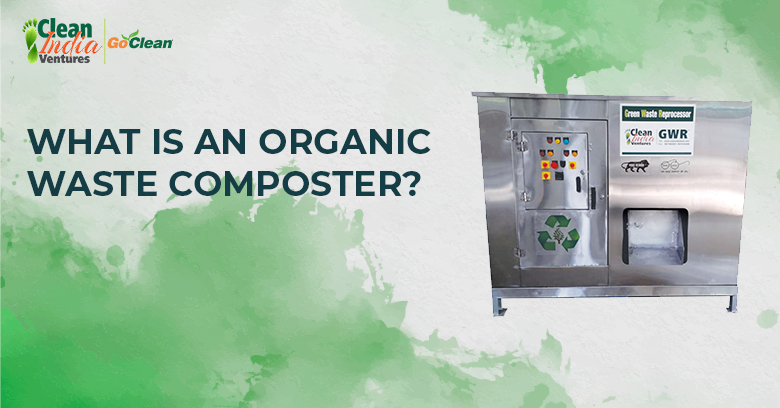To understand this, we first need to understand Composting. In simpler terms, it is a method to convert solid organic waste into compost which in turn helps increase the fertility of the soil. In a more specific manner, it is a way to treat solid waste where microorganisms break down the organic material(waste) which helps the natural process of decay.
Now an Organic Waste Composter is a device that helps decompose the organic waste into nutrient-rich humus or compost. In other words, it is not a substitute for natural decomposition, it just accelerates the process by controlling the natural conditions such as heat, humidity, and moisture. Most of the Organic Waste Composter in the market.
Read Also: Organic Waste Converter and how it’s done
It is typically a big box-like machine and consists of:
In-built shredder: It is used for shredding the waste which helps speed up the decomposition process.
Mixing blade: It is for mixing up the waste for the even distribution.
Humidity sensor & heater: The microorganisms and enzymes decompose the organic compost and turn it into the compost, requiring the ideal conditions so they can multiply and operate at full efficiency.
Air ventilation system: Aerobic organisms need to breathe air to survive. In high-temperature aerobic composting, Aeration is necessary for rapid odor-free decomposition. It also helps reduce high initial moisture content in composting materials.
Moisture control system: When the pile is soggy, the gaps between the organic pieces fill with water and the pile becomes too dense to support aerobic bacteria and other organisms.
You also need sawdust which acts as a moisture regulator material for composting raw materials, or as a sludge with high moisture content, livestock waste, and waste. Also, the use of enzymes helps break down the wastes at an accelerated rate.
Moreover, compost is a better alternative to traditional manure as it is first, readily available, unlike manure which takes its own time to form. Secondly, it stabilizes the pH of the land which normally the manure can’t do efficiently. Additionally, manure can have weed seeds which is often a trouble for the farmers.
What are the types of organic waste?
Organic waste is the biodegradable waste that comes from plants & animals. Some examples of organic waste include green waste, food waste, food-soiled paper, non-hazardous wood waste, green waste, and landscape, and pruning waste.
We can classify Organic Waste into 4 types:
- Industrial
- Domestic
- Commercial
- Agricultural
Let’s discuss a little about each one of them.
Industrial waste: When talking about industrial waste, people often think that it is only the hazardous one but many cottage and herbal units have tons of organic wastes every month.
Domestic waste: It is the common waste in our households like fruit peel-offs, food scraps, etc. It could also be non-putrescible waste like paper, cardboard, wood, etc.
Commercial waste: This is the common waste produced from schools, restaurants, hotels, etc. This type of waste is generally organic in nature.
Agricultural waste: This is the biggest contributor to Organic Waste. Leaves, rotten fruits, and vegetables, etc. can be converted into compost which ultimately helps them back by making their lands more fertile.
How can we reduce Organic Waste?
Organic waste is one of the biggest causes of pollution. Dumping this waste into landfills not only causes soil & land pollution but also leads to many infectious diseases. Also, due to the lack of oxygen, organic waste undergoes the process of anaerobic decomposition when it’s buried in a landfill. This leads to the generation of methane, which is then released into our atmosphere and harms it. The studies show that the methane gas generated from food waste is 20-25 times stronger than CO2.
Govt. has also set up many rules and regulations in this direction recently. According to Swach Bharat Abhiyan’s initiative, if your business comes under a bulk waste generator i.e. producing organic waste of more than 15 kg per day then you need to have an organic waste machine for its treatment.
However, we should not wait for the govt. to come into the picture. Instead, it should be our shared responsibility to help reduce the stress on our land and soil.
An Organic Waste Composter can be seen as an investment from the perspective of the cottage and organic industries. Not only it helps saving loads of money goes into dumping and treatment of the waste, but can also be an alternative source of income. Societies or RWA’s can also install an Organic Waste Composter to help reduce the waste and make their localities clean and green. Further, schools & colleges, and hotels & restaurants can install an Organic Waste Composter and contribute their bit to the environment and keep their premises clean. For the Agricultural sector, it is a boon which can directly profit them by making their land rich in nutrients.
At last, keeping our surroundings Clean & Green is our shared responsibility, so why don’t we do it innovatively and profitably?
